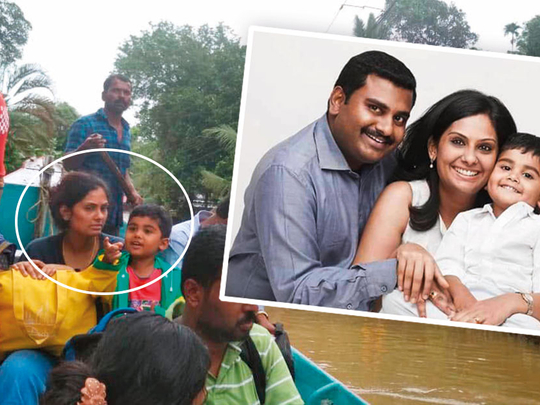
Dubai: A month after devastating floods changed their lives, expat victims from the South Indian state of Kerala are slowly getting back to normal life in the UAE.
However, the scars left behind by the floods will take time to heal, especially for those who went through traumatic experiences.
The family of Aji George, a soft services manager with Dubai Parks and Resorts, once enjoyed the waterfront view of their home on the banks of the river Pamba in Chengannur, one of the worst hit areas, back home.
Even when the local authorities sounded the alert on that fateful day, they did not expect the water to swallow the ground floor of the house in no time.
“We didn’t have the time to lift all furniture. We went upstairs. We were there for three nights. We tried all the sources, but in vain. We tried calling the army, but they couldn’t reach our home. We were ready to pay for airlifting. But we realised that money cannot save us,” said Aji.
Eight members, including George, his wife Kowshika Mallesh, four-year-old son Auro, parents, parents-in-law, and a driver were finally rescued by fishermen.
“When we went in the boat, we saw houses submerged and people shouting for help and animals screaming. We saw dead animals everywhere … caged dogs not able to go out,” recounted Aji.
The family was agonised to see people begging to be rescued.
“There were houses in the paddy fields with people up to neck-level water screaming for help. The fishermen had to leave them behind since there was one more family with three-month-old twin girls in our boat. They knew that if the boat went there, they won’t be able to control it and it would capsize. I want to believe that they went back and rescued them,” said Mallesh who works with the talent management team of Majid Al Futtaim Group.
At the relief camp run by a church where they spent two days along with hundreds of flood victims, the family also witnessed the death of a man due to cardiac arrest.
The family had to hire a team of workers for the cleanup of their house which went on for around two weeks. “The compound walls were completely broken, the well had to be drained and cleaned, the plumbing had to be done, all the furniture and electronic appliances on the ground floor had to be replaced, and the floor tiling in the backyard also had to be changed,” said Mallesh.
She said their son Auro, who was initially excited about the water coming to the backyard, was soon in trauma and couldn’t sleep. “He didn’t cry … but went into complete silence.”
Even after his parents returned to Dubai, Auro had to stay back with his grandparents as he was down with fever. “He reached last week and has started going to school. We are taking him out often and trying for him to have new experiences to help him come out from what we went through,” Mallesh said.
School’s support
“His school has been very supportive. But I don’t know if they are providing any counselling services. He is still small. At least for the elder kids, calling them and talking them will be great. If the schools are not doing it, they should be doing it,” said Mallesh.
Some schools like Delhi Private School in Dubai are doing their bit to support the flood victims.
“In our school we engage closely with teachers and students, encouraging them to share their experiences,” said the school’s principal and director Rashmi Nandkeolyar.
“We have launched a blog, “The Heart of a Teacher”, where we invited teachers to share poems, drawings, doodles, photographs and articles of their experiences. Students were similarly invited to conduct a special assembly to share their thoughts and experiences through songs, poems and skits. We also bent the rules for flood affected teachers and students who joined a few days late. Some tests were rescheduled to accommodate students arriving late. Besides all this, we have offered financial help to affected teachers to show our solidarity.”
Tackle grief to avoid depression, psychologist says
The loss that people have experienced in the aftermath of the recent floods in Kerala is immense. Although Kerala receives its share of rains every year in huge amounts, the recent floods have created a very different impression and picture about rains in the minds of people, said Sailaja Menon, licensed counselling psychologist at Lifeworks Holistic Counseling Centre.
“It is fear, loss, deep sadness, loss of a loved one, loss of a lifetime of savings, destruction of personal possessions and reliving the traumatic experiences to name a few.”
However, Menon said these are normal reactions to an abnormal situation.”
“It is totally okay for anyone who has undergone this experience to feel this way. However, to cope, it is important that we understand what we are feeling, how long we are feeling it and how to learn coping strategies to overcome them.”
She pointed out that grief is a normal, natural, inevitable process that every human being will experience in their lifetime. However, when unresolved, it can lead to acute anxiety and depression.
Victims should find new meaning in living and live without the fear of future abandonment, she said. Acknowledging it is okay to feel bad from time to time and to talk about it and being able to forgive others when they say or do things that you know are based on their ignorance and lack of understanding are some measures to cope with grief.








